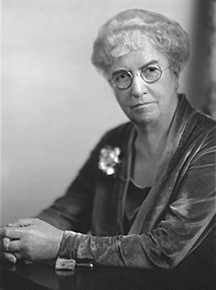Home economics now viewed as historical gateway for women into higher education, science and professional careers
By Susan S. Lang
As the College of Human Ecology at Cornell celebrates the centennial of the field of home economics with events throughout the year, its faculty and administration are reflecting on the college's role as the gateway for women into higher education and scientific careers over the past century.
"Home economics was the major pathway for women into public education in the late l9th and early 20th centuries, providing entry to a wide variety of careers for women in academia, business, public education, government and health care up until the l960s," says Joan Jacobs Brumberg, Stephen H. Weiss Presidential Fellow and professor of human development at Cornell.
As a social and cultural historian of the United States, Brumberg explains that "historians no longer view home economics merely as glorified housewifery but as an early model of how American women began to apply basic research in science and medicine to the improvement of human lives, specifically to meet the needs of their families and communities."
Brumberg, who is teaching a new archival research course this fall, Exploring the History of Home Economics, acknowledges that although departments of home economics were "female ghettos," home economists were never confined to the home. They went public and helped raise the standard of living in the 20th century. They disseminated information about medicine, improved sanitation and public heath, child development, scientific nutrition, rural electrification and functional home and environmental design. They also were implicated in many of the progressive era reforms that led to the modern welfare state.
"Home economics deserves to be identified as one of the most important of the feminized service professions, along with teaching, nursing and social work," says Brumberg. "In the history of home economics lies the history of women in America in the 19th and 20th centuries; it serves as an allegory for what has happened in terms of gender roles, changing families, labor force participation and the hegemony of science as a way of improving human life." The centennial celebration marks the 100th anniversary of the hiring of Martha Van Rensselaer at Cornell to develop a reading course for farmers' wives that would bring new information about household management and child guidance to rural farm women. This early "distance learning" effort became the genesis of the home economics movement in New York State. In the 1920s, the League of Women Voters voted Van Rensselaer one of the 12 most admired women in America, but she is not yet included in the Women's Hall of Fame in Seneca Falls, N.Y., although her nomination has just been submitted.
Cornell is the only Ivy League school with a College of Human Ecology (formerly the College of Home Economics), the first such college in New York state and one of the few such programs at a premier private research university. The college changed its name to the College of Human Ecology in 1969 to reflect current curricula and research priorities. Since that time, more men have become faculty and students in the college's diverse science, social science and design programs.
Many feminists in the 1960s and 1970s denigrated these programs because "anything that smacked of domesticity was considered a shackle on women's opportunities," says Brumberg. However, she says, "Since the early 1990s, feminist scholars have been rethinking home economics in terms of its many meanings and opportunities it provided for American women."
Renewed interest in home economics has generated sessions on the subject at various professional meetings recently, and Brumberg notes a growing interest among students in the history of the field.
Says College of Human Ecology Dean Patsy Brannon, "As we look to the future of this field, we see both men and women applying the sciences to human development, health, the life course, families, communities and work, and the balancing of these forces. It's the same set of driving forces that engaged home economists 100 years ago; just the history and social context keep changing."
Planned centennial events include a national satellite video conference on "Human Sciences Policy Impact" Feb. 1 and the exhibit opening March 30 at Kroch Library, "What Was Home Economics?" This will be accompanied by a World Wide Web site launching and the publishing of a booklet, "The History of Home Economics -- The Future of Human Ecology."
Media Contact
Get Cornell news delivered right to your inbox.
Subscribe